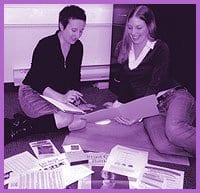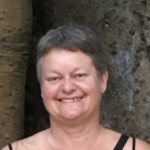Of the issues that lesbian and bisexual women struggle with when it comes to breast health, those around being queer and facing homophobia in healthcare are among the biggest. The Lesbian And Bisexual Women’s Breast Health Project is looking to change that.
“Homophobia and biphobia can cause lesbian and bi women to delay going for all kinds of care,” says project co-ordinator Cheryl Dobinson. “Most materials are targeted and are not inclusive to lesbians and gays, so queers may come away without retaining information.
“Queer women have also realized that healthcare providers don’t have an awareness of their issues. If they only talk about boyfriends or husbands and always refer to a women’s femininity it leaves many queer women out.”
Dobinson explains that although it isn’t being a lesbian that makes women at a higher risk for breast cancer, on average, “lesbians may have higher body weight, higher alcohol use and, if not having a baby, may not be encouraged to have regular gynecological exams, pap tests, clinical breast exams or mammograms.”
The project will train volunteers to offer peer support and encourage women to develop a better relationship with their breasts with the hopes of promoting better screening practices for cancer.
To better serve queer women who have already been diagnosed with cancer, the project will involve working with existing agencies to help them become better acquainted with the specific needs of lesbian and bisexual women.
“We decided to pilot a support program for lesbians and bis living with breast cancer with Gilda Club, a community based cancer support agency,” says Dobinson. “We are also piloting a training program for volunteers at Willow Breast Cancer Support And Resource Services.”
The project isn’t the only initiative currently trying to get us thinking about cancer. The Canadian Cancer Society (CCS) is holding a town hall meeting on Sat, Nov 27 to give queers a chance to offer feedback to the bigwigs at the CCS about how they could better address queer needs.
Jennifer Alexander is one of the CCS volunteers organizing the meeting and is all too familiar with what it’s like to be a lesbian dealing with cancer. Her partner of 21 years passed away four years ago after a six-year battle with cancer. Alexander learned firsthand about the lack of services for queer women, which is what inspired her to get involved.
“The CCS is inviting the gay community to The 519 to talk about what gaps there are in services,” says Alexander. “We have a panel of four speakers from the CCS, three professionals speaking on behalf of the gay community and nine queer cancer survivors who will speak of their stories. One woman lost her partner of 47 years and will be speaking. The gay community is saying this is what we need and what we’re up against.”
Alexander is also involved with the Wellspring Cancer Support Centre, which recently adopted a support group she started out of her home more than a year ago for lesbians and their partners. “Out of that I know we need a group for partners themselves. There is also a need for a men’s group.”
* Volunteers are currently being sought for the project Making Us Visible: Promoting Access To Breast Health And Breast Cancer Services For Lesbian And Bisexual Women. For more information contact Cheryl Dobinson at (416) 324-5063 or e-mail cdobinson@sherbourne.on.ca.
The Canadian Cancer Society Town Hall Meeting takes place on Sat, Nov 27 from 10am to 2pm at the 519 Community Centre (519 Church St).
The Wellspring Cancer Support Centre (81 Wellesley St E) offers a lesbian-specific support meeting the first Thursday of every month from 7pm to 9pm.


 Why you can trust Xtra
Why you can trust Xtra


